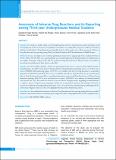Please use this identifier to cite or link to this item:
https://hdl.handle.net/20.500.14356/1204| Title: | Awareness of Adverse Drug Reactions and its Reporting among Third-year Undergraduate Medical Students |
| Authors: | Rauniyar, Gajendra Prasad Pandey, Dipesh Raj Rauniyar, Nancy Tiwari, Amol Aparajita Sah, Kunal Kumar Nivedita Mandal, Prativa |
| Citation: | RauniyarG. P., PandeyD. R., RauniyarN., TiwariA., Aparajita, SahK. K., Nivedita, & MandalP. (2022). Awareness of Adverse Drug Reactions and its Reporting among Third-year Undergraduate Medical Students. Journal of Nepal Health Research Council, 19(04), 762-766. https://doi.org/10.33314/jnhrc.v19i04.3714 |
| Issue Date: | 2021 |
| Publisher: | Nepal Health Research Council |
| Article Type: | Original Article |
| Keywords: | ADR BPKIHS MBBS students |
| Series/Report no.: | Oct-Dec, 2021;3714 |
| Abstract: | Abstract Background: Drug is a double-edged sword. Though important, Adverse Drug Reactions under-reporting is real and is mainly due to lack of awareness. No published research has ever evaluated the perspective of third year medical students towards Adverse Drug Reactions reporting. The objective of the study was to evaluate awareness of Adverse Drug Reactions and its reporting among Third-year Medical Students of BP Koirala Institute of Health Science. Methods: It was a descriptive cross-sectional questionnaire-based survey using google form conducted between 09/01/2020 to 09/28/2020. Any consenting third-year medical student of BP Koirala Institute of Health Science was eligible. Descriptive analysis of the data was performed using Microsoft Excel. Ethical clearance was obtained from Departmental-Research-Unit which is under IRC. Results: Out of 80 eligible students, 79(98.75%) participated in the survey. 31.6(25%) had reported Adverse Drug Reactions. 36.7(29%) were aware of National Adverse Drug Reactions monitoring service. 12.7(10%) were aware of BPKIHS ADR monitoring. Again, 35(49.30%) were familiar with Adverse Drug Reactions to a particular drug whereas 29(40.85%) and 28(39.44%) were even familiar with Adverse Drug Reactions to a new product and Adverse Drug Reactions of serious (life or organ threatening) nature respectively. Regarding barriers to Adverse Drug Reactions reporting, 64(83.12%) were uncertain how to report; 39(50.65%) were unaware of existing National ADR system and 33(42.86) could not decide if it was an Adverse Drug Reactions. Regarding recommendations to improve Adverse Drug Reactions reporting, 73(94.81%) recommended education and training, 57(74.03%) stressed on collaboration among health professionals; 52(67.53%) said Adverse Drug Reactions reporting should be professional obligation whereas 51(66.23%) highlighted feedback from Monitoring Centers. Conclusions: We evaluated the awareness of Adverse Drug Reactions and its reporting among third-year medical Students of the institute which was relatively poor compared to other study population like doctors and pharmacists. Keywords: ADR; BPKIHS; MBBS; students. |
| Description: | Original Article |
| URI: | http://103.69.126.140:8080/handle/20.500.14356/1204 |
| ISSN: | Print ISSN: 1727-5482; Online ISSN: 1999-6217 |
| Appears in Collections: | Vol. 19 No. 04 (2021): Vol 19 No 4 Issue 53 Oct-Dec 2021 |
Files in This Item:
| File | Description | Size | Format | |
|---|---|---|---|---|
| 3714-Manuscript-26786-1-10-20220313.pdf | Fulltext Download | 166.58 kB | Adobe PDF |  View/Open |
Items in DSpace are protected by copyright, with all rights reserved, unless otherwise indicated.
